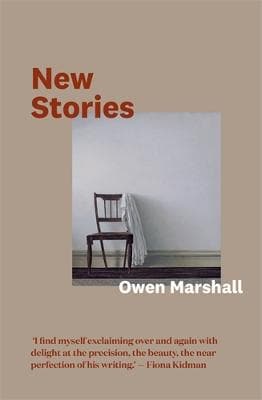Review: New Stories, by Owen Marshall
Reviewed by David Hill
Book lore says that short story collections don't sell well. Readers prefer the slow unscrolling, the total immersion of a novel, where they can get to know characters and settings in detail. Short fiction is best kept for lit mags or competitions.
Someone forgot to tell Owen Marshall. His multiple collections and selections are welcomed in schools, universities, libraries, bookshops. He's a master, a stand-out, a virtuoso of the form. He's also such a modest bloke that he's probably squirming as he reads this paragraph.
This quietly-titled assemblage, with its equally quiet cover by Marshall's great mate Grahame Sydney, is a generous helping of 27 narratives. Most are in the 5000 – 8000 word range at which the author excels. (Why am I bothering you with the maths?) A few are brief, almost photo album glimpses.
Their protagonists are predominantly male, though Owen Marshall can also work with women – and I'm sure I could phrase that better. These women include ex-lawyers, executives, potential Parisian travellers. He even notices their handbags: “There's something about genuine Italian leather.” But it's the chaps who do most of the narrating. They're typical Marshall men, sometimes laconic of speech but always rich in thought and internal dialogue. They get away with aphorisms which in the case of other writers might have you lifting your eyebrows: “It's part of a major shift in the female role in society”.
They're rural or urban, even urbane. A lot are explicitly or implicitly provincial, which is a milieu Marshall has long mined successfully. They can be worldly and worn. They're always thinkers and watchers, always interested in the world. They're successful or challenged or disillusioned. “He was thirty-four and disappointed.“
Here in New Stories, most of them are significantly older than 34. They recall longer stretches of time: the journal one kept on his first trip overseas, decades back; the sexual slip another sees repeated by his son, with graver results. They've had adventures, on a chartered yacht with a possible killing; in Wales with a beguiling fellow guest. And they've had responsible, productive, usually careful lives.
Now their partners may have left or died; their working lives are over. A few have taken up bowls – Pilates for the women. For the less fortunate, physical frailty and mortality have eroded existence. Michael lies in hospital, and accepts he won't be coming out. Sadness is there, but never histrionically. Quiet resignation rules. One story is called “Stepping Down”, and a number of the narrators are doing just that. As Tony realises when he makes an unwise return to his workplace, 'he was ordinary now'.
Settings are mostly Aotearoa New Zealand, by implication or specific reference: Wellington's Roseneaath; Moeraki; Middlemarch with its Rock and Pillar Range. Marshall can do a factory as deftly as a crag.
There's always something happening, externally or internally. Constable Kevin is peeing in the bushes when he witnesses a major drugs drop. Albie's cousin climbs high to bid farewell. We get a ram-raid without the ram; a family reunion; voluntary incarceration, a whole range of changes.
You always learn things from a Marshall story. (The guy was a school teacher, after all). In these 27, you hear about fitting a prosthetic hoof to a giraffe; health supplements; Tiberius and Augustus; Lloyd George's promiscuity; the Hittites and King Ŝuppiluliuma. It's apposite. It's rewarding.
You also learn what good writing is. Marshall's prose is restrained, crafted, lucid. A thoughtful chap (it's mostly a chap, remember) is chatting to you, treating you as an equal. Characters speak in good grammar and unhurried, almost stately cadences. A single story may contain multiple viewpoints, which build a satisfying ambivalence.
So – stories that are calm, crafted, that often imply more than they say. The word that kept trekking through my head was grown-up. Skill without flashiness; gravitas with curiosity: they're grand pairings. May the author live
forever.
Reviewed by David Hill
